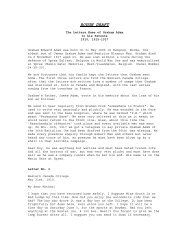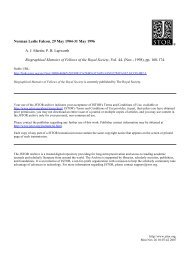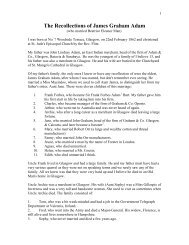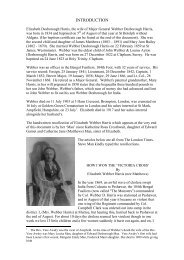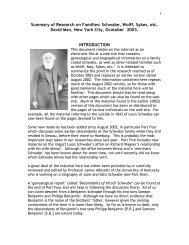Richard Craddock's Career with the East India Company - Man Family
Richard Craddock's Career with the East India Company - Man Family
Richard Craddock's Career with the East India Company - Man Family
You also want an ePaper? Increase the reach of your titles
YUMPU automatically turns print PDFs into web optimized ePapers that Google loves.
42<br />
However <strong>the</strong> main purpose that Craddock was at Gombroon for<br />
was to negotiate <strong>with</strong> <strong>the</strong> King of Persia on <strong>the</strong> proportion<br />
of customs duties that <strong>the</strong> <strong>Company</strong> was owed. Unfortunately,<br />
like his predecessors, he was stymied at nearly every turn<br />
and after a time he wrote to Sir George Oxenden in<br />
frustration suggesting <strong>the</strong> use of force to settle <strong>the</strong><br />
company’s claims; but Oxenden doubted <strong>the</strong> expediency of<br />
such a course. It seemed to him improbable that <strong>the</strong> Persian<br />
King would be brought to reason by a blockade of his ports,<br />
for ‘he hath no shipping’ and <strong>the</strong> merchants engaged in <strong>the</strong><br />
trade to Gombroon were mostly <strong>India</strong>n. In <strong>the</strong> second place,<br />
<strong>the</strong> Dutch would be likely to step in to <strong>the</strong> breach and<br />
carry all freight goods, thus rendering <strong>the</strong> blockade<br />
nugatory. Thirdly, <strong>the</strong> Mogul Emperor would almost certainly<br />
resent any restriction placed on trade between <strong>India</strong> and<br />
Persia. Craddock was advised that <strong>the</strong> Persians would not<br />
be sorry to find an excuse ‘to out you of your royalty of<br />
customs’ and it would be better to suffer patiently <strong>the</strong><br />
present grievances. Craddock was also advised to no longer<br />
travel to <strong>the</strong> Persian capital (Isphahan) in <strong>the</strong> hope that<br />
<strong>the</strong> Persians<br />
would notice his<br />
absence and<br />
<strong>the</strong>reby draw<br />
attention to<br />
<strong>the</strong>ir wrongs and<br />
pave <strong>the</strong> way for<br />
a reconciliation.<br />
Whe<strong>the</strong>r or not<br />
this course of<br />
action succeeded<br />
we do not know.<br />
(EFI 61-64, pp.<br />
213-214)<br />
The <strong>East</strong> <strong>India</strong><br />
<strong>Company</strong> had<br />
always found<br />
Gombroon an unappealing place both because it was hazardous<br />
to <strong>the</strong> lives of those residing <strong>the</strong>re and its continued lack<br />
of commercial success. In a letter sent by <strong>the</strong> <strong>Company</strong> to<br />
Surat dated 10 August 1663, Sir George Oxenden and his<br />
colleagues were given two choices as to what to do <strong>with</strong> <strong>the</strong><br />
factory at Gombroon.<br />
The first was that a few persons should be found who would<br />
be willing to reside <strong>the</strong>re at <strong>the</strong>ir own expense in order to



